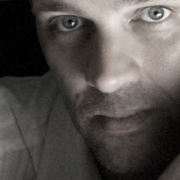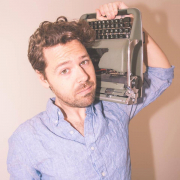Copywriter of the Week : Simon
Introducing our copywriter of the week, Simon
Asked to write this piece presented me with a bit of a dilemma. There are several things I like about being a writer. The fact I’m creating something, the problem solving that comes with it but possibly what I like most is the anonymity. I stay hidden behind a wall of words. Words that may not even sound like me.
I’ve always believed my work should never be about me. But instead should reflect and reveal the personality, the brand, the company that really own those words.
I will tell you a little about me at the end. But I thought I would pass on something more useful to you. Tips on how to treat the copywriter in your life.
First up, the question you hear most as a writer is, can I see examples of your writing? Of course. But what I really want to tell you is, there’s no point.
Part of being a writer is rewriting. Most of the rewriting is a result of client input. Don’t get me wrong, this is essential, but it seldom improves the copy. And with some clients, it will have a detrimental effect on the style and flow of what has been written. It’s my experience that 70% of the final copy is no longer the writer’s copy. But a collaboration between one, or if you’re really unlucky, a committee of clients. Then there’s the brief to consider, if you fundamentally believe the position of product or brand is wrong, then you’re not going to think much of the copy.
Maybe you’re looking to see what tone of voice they write in. Well, you won’t be able to tell. I’ve created the tone of voice for The Body Shop, a female-empowering cosmetic company, but I’m also responsible for GiffGaff’s, a youth-focused challenger brand, as well as Sky’s, and ITV and Fox’s biscuits. I could go on. What’s really important to remember is, a skilled copywriter doesn’t have a single style. His job isn’t to make all his clients sound like her but to make him sound like his clients. In that respect we’re impersonators.
So, what should you do? Well, talk to them about your brand, listen to what they have to say. Do they understand your brand’s personality? Do they know where you are in your sector? And what job you’re trying to do? Do they make sense?
The second most popular question, and another that’s less than helpful 95% of the time is, do you know my sector? More often than not, a good writer will have relevant experience, but unless you’re in the 5% who really do need specialist insight (nearly always in the legal, finance or science sectors in my view), a writer doesn’t need it.
It’s much better to see you and your copywriter as a team that complement one another’s weaknesses. You are the expert in your field, that’s a big part of what you bring to the table. All the writer needs to be able to do is write compelling copy, that will move, educate or prompt action. Their skill is to communicate their knowledge.
In fact, I’ll go as far as to say, in some cases, experience in your sector is the last thing you want. For example, Monzo an online bank briefed me on help with their tone of voice, based on the work I had done on tea pigs.
One final piece of advice, never, ever, EVER brief copy unless you and your writer are agreed on The Three Cs. Content. Context and Character.
The first is the easiest, it’s the copy brief the stuff that needs to be said from the Brand name to what makes it different from its competitors etc. Context is your brand’s viewpoint, how you see your world, how you want people to think about your brand, stuff like that. Character is your brand essence, are you funny or serious, established or challenging, reckless or cautious?
If you and your copywriter agree and understand all that, you’re going to create some great work together, and some have fun doing it.
If you’ve read this far then, it’s only fair I keep my promise and tell you a bit about me. My formative years as a copywriter were spent in some of London’s most fashionable and most creative agencies. I won nearly every award doing (damn you, Cannes Lion!) and rose all the way to becoming an Executive Creative Director and then co-owner of two agencies. Unfortunately, this meant less writing, the very thing that brings calmness to my soul, so I had no choice but to walk away and redefine my work life.
Over ten years later I’ve worked on everything from famous brands, and international corporations to family-run companies and fresh new old start-ups. I’ve written, ads, brochures, websites, commercials. I’ve advised on how brands should sound, helped clarify what they stand and crafted manifestos etc. As well as this, I’ve written an award-winning feature film, several shorts, two documentaries and a novel (to be published in 2021, hopefully).
Today, I feel blessed to be able to get up every day and get paid doing what I love. With your help, long may it continue.
Interested in hiring Simon for a project? Contact Copywriter Collective today.


 Gary-copywritercollective
Gary-copywritercollective 

 Mohamed-copywritercollective
Mohamed-copywritercollective Trish_-copywritercollective
Trish_-copywritercollective Mirka-copywritercollective
Mirka-copywritercollective SEOMistakes-copywritercollective
SEOMistakes-copywritercollective Home Office Solutions-copywritercollective
Home Office Solutions-copywritercollective